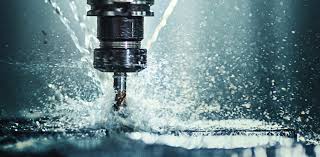
What is a cnc machine and How Does It Work?
Understanding the CNC Machining Process
CNC (Computer Numerical Control) machining refers to a certain type of manufacturing in which particular tools and machinery are operated using software that has been pre-programmed. CNC provides automation to intricate processes of custom parts manufacturing. It begins with a certain design in mind, which is usually done in CAD software and which is later converted into a code that can be read and understood by the computer. The code makes use of machining tools and commands them to cut, drill, mill, and shape the material into components as accurately as possible. One of the many advantages of CNC machining is the unparalleled accuracy and replication capability of intricate shapes that would normally be impossible to carve by hand.
For more in-depth information, you should view the CNC Machining Services – ETCN.
Types of CNC Machines Available
Many types of CNC machines exist, and they are built specifically for certain tasks and materials. These include:
- CNC Milling Machines – With these machines, rotating cutting tools carve out intricate shapes by removing material.
- CNC Lathes – Best used for cylindrical components, a lathe is a machine that rotates the workpiece while the cutting tools shape the material.
- CNC Routers – These are mainly for wood, plastic, or foam, and they are cutting and engraving machines.
- CNC Plasma Cutters – These are cutters that use high powered plasma torches to cut steel, aluminum and other conductive materials.
- CNC EDM (Electrical Discharge Machines) – EDM specialize in shaping hard materials and these machines perform the task with no contact, using electrical discharges instead.
- CNC Grinders – This type of machine is used to carry out precise surface finishes and for tightening the tolerances on metal or other materials.
Selecting the appropriate type of CNC machine depends on the materials, finish and project specifications. Each type of machine is equally important in today’s manufacturing world.
Applications of CNC Machining in Various Industries
The impressive accuracy and precision of CNC machining make it applicable in almost all sectors today. These include:
- Aerospace – For turbine blades, engine parts, and structural components critical for safe flight.
- Automotive – For gears, shafts, and assorted car prototypes.
- Medical – For surgical instruments, prosthetic limbs, and medical implants.
- Electronics – For minute, complex components, including circuit boards and their cases.
- Industrial Manufacturing – For machine parts, housings, and fixtures.
- Consumer Goods – For custom-designed furniture, sports equipment, and homeware.
Because of CNC machining, adaptability, innovation, and efficiency are supported in various fields where high precision and reliability are inevitable.
What are the Different cnc machining materials Used?
Advantages of Using Metal in Custom CNC Machining
One of the best materials used for CNC machining is metal because of its unique attributes and properties. Metals such as steel, aluminum, brass, and titanium are highly durable, strong, and able to withstand extreme temperatures. It makes them suitable for applications that need strength and longevity. For example, aluminum is strong but very light, and steel is extremely hard and anti-corrosive. Moreover, metals are easy to machine, even in the most delicate and intricate shapes. Their conductibility to heat and electricity also makes them very useful within the aerospace, automotive,e and electronic industries.
Using Plastic for CNC Machined Parts
Plastics are also being used extensively in CNC machining due to their lightweight, economic costs, and advanced resistance to chemicals. Some of the common ones, such as ABS, polycarbonate, and nylon, are selected because of their flexibility and easy machining. Plastics are the most popular choice for medical and consumer electronic devices, prototypes, and other parts where complex shapes are needed because they are easy to shape. Also, being electrically insulating, biologically inert, and showing strong corrosion resistance offers a great advantage in applications where metals fail. And finally, engineering plastics are incredibly strong while still being lightweight, which is great for decreasing part weight without compromising strength.
Comparative Analysis of Metal and Plastic in Custom Parts Manufacturing
A custom CNC machine is much more versatile; however, when deciding whether the object being produced should be made of metal or plastic in parts, there is a lot to consider. Metal will always be preferred where stiff structures are required, and all components are surrounded by harsh environments or relatively heavy sections, and high strength combined with precision machining is necessary.
On the other hand, when the project is lightweight and cost-sensitive or when components need to be insulated electrically or protected chemically, plastic is beneficial. It is a fact that metals have longer lives, but the initial cost is much higher compared to machining plastics. Further, when large volumes are needed, plastics are better suited as they require less time to machine. In the end, the choice depends on the specific conditions and needs dictated by the project, aided by manufacturers aiming for performance engineering and economic feasibility.
How to Get an Instant quote for Your cnc machining service?
Steps to Follow for a Quick Online Quote
Upload Your Design File
Start off by uploading your CAD design file in a supported format as a STEP, IGES or STL. The file serves as a blueprint of your machining needs ensuring correct cost estimation.
Specify Material and Finish Options
When it comes to selecting the appropriate material for the project, anywhere from metals like Aluminum or stainless steel to plastics such as ABS or PEEK can work. Moreover, you may also specify the surface finish details like anodizing, powder coating, or polishing.
Provide Dimensions and Tolerances
Make sure to provide size dimensions, tolerances, and other specifications that are critical for the part within engineering means ensuring the product meets engineering standards.
Indicate Quantity and Delivery Timeline
Tell the service what the expected production quantity is – one prototype or several – large production batch or small, and what your desired delivery date is.
Review and Confirm Details
Revisit to ensure all the relevant information is accurate. Submit and claim your request, and based on the information given, expect a quote in return.
What Information Is Required to Request a Quote?
The following details will aid in receiving a prompt and precise quote for CNC machining:
- CAD Design File defining the exact dimensions of the part.
- Material Specification, mentioning grade or type.
- Finish requirements if any.
- The number of parts to be manufactured.
- Any design tolerances or special instructions for the work.
- Delivery Expectations concerning project duration.
Completion of these fields allows the service provider to give an insightful estimate for the machining service catered to your need.
Benefits of Using an Online CNC Machining Service
The use of CNC machining services offers unimaginable benefits, such as:
- Cost Effectiveness: Reduced business expenses and automated systems lead to maximum profitability.
- Automation Provides Competitive Pricing: Advanced automated systems reduce business expenses and promote competitive pricing.
- Convenience and Speed: Quotes are issued in real-time, and designs are submitted directly to CNC machines, allowing for orders to be processed with minimal delay.
- Access to Expertise: A department manned by seasoned machinists guarantees constant and wide-ranging material availability for any industry niche.
- Wide Scalability: Whether it is prototypes or mass production, online services adjust to every project’s dimensions.
Comparing modern methods to older techniques online, through using the internet, allows services to increase their efficiency and precision while greatly improving customer satisfaction and timely order execution. Businesses are able to meet tough deadlines and complex requirements effortlessly.
What are the Advantages of cnc machining?
Precision and Accuracy in CNC Machining
CNC machining is one of the few technologies that has and continues to be relied upon for accuracy and precision when it comes to parts and components that are complex in nature. Parts that are manufactured by CNC machines have tolerances between ±0.001 inches, which is baffling and is achieved through the use of computer-controlled tools.
For this reason, turning to reputed firms, such as Fast Cut CNC, or similar other ones, can ensure that projects are completed with precision and care. Furthermore, the ability to handle different materials and complex designs can make these machines a valuable resource where consistent quality can be important. Such precision is paramount in specialized fields such as aerospace, healthcare, or even the automotive industry , where the margin for error is almost non-existent.
Cost-Effectiveness of Custom CNC Machining
Small and large-scale manufacturers alike can benefit from custom CNC machining and the cost-effectiveness that it has to offer. Custom CNC machining has an immense degree of automation which allows for minimal manual intervention, resulting in lower workforce costs. There is also a high level of efficiency when it comes to material use. This, combined with lower manufacturing costs, makes CNC machining incredibly appealing. For custom projects, the ability to quickly adjust designs and parameters without significant downtime further enhances ROI. Because of this lack of compromise on quality or flexibility, many manufacturers choose CNC machining.
Speed and Efficiency in Machining Projects
CNC machining has one clear advantage as far as project lead times are concerned: quick and economical production. Sophisticated programming enables the machines to move very quickly while still being able to produce high-quality components with complicated shapes. Furthermore, CNC machines can be set to work unattended after preparation. This speeds up the work even further, which is unheard of in the case of manual machining. This advantage of machining is very important for industries that need fast prototypes, parts, or assemblies because they are able to meet deadlines without compromising quality.
What are Common cnc machining faqs?
How Long Does the CNC Machining Process Take?
The CNC Machining duration is dependent on the set of feature parameters such as geometry, material, and production volume. Non-complex geometries and parts features can be produced in hours, while more complex components that require several different operations can take days. In addition, there is also a learning curve with the setup of tooling and the programming of the machines, which need to be factored into the lead time for the first production run. After the initial setup is done, however, the efficiency of CNC Machining is high, and quick turnarounds are achievable.
CNC Machining Tolerances: What Are They?
CNC Machining is always associated with precision and stringent tolerances. Tolerances approximately range with the machine and process from 0.005” ± (0.127 mm) up to 0.001” ± (0.025 mm) for more critical components. These set tolerances may change with the material in question, tool life, and the particular machining processes, but the highly accurate results of CNC Machining are always there irrespective of the complicated geometry.
Can I Prototype with CNC Machining?
The answer is yes; there are many CNC machines available that can make all kinds of prototypes. The wide availabiity of the machines means that one can make precise and useable prototypes that are made from materials that will be used in the final product. For this reason, CNC machining is perfect for determining how a part is supposed to work, how it will fit, and how it will perform under specific conditions ahead of bulk production. In addition, the adaptability of CNC technology makes it possible to build a great number of prototypes to fine-tune the design, which is the most common need in cycles of product development.
How do you select a quality CNC machining service provider?
What to Look For in CNC Machine Shops
There are various things you need to focus on, including the results. It would help if you started with the shop’s capabilities in dealing with different materials and working with different processes. A look for standards like ISO 9001 or AS9100 will also help since these show that the shop meets mainstream quality management standards. Determine the level of sophistication of the tools and equipment available in the shop to check if it corresponds with the requirements of your project, such as maintaining specific tolerances or intricate shapes.
It is also useful to check what projects they have done in the past and what their clients say so you can know if they are reliable in terms of quality. Last but not least, be sure to check their estimated timelines, how they communicate, and if they provide supplementary services like finishing or assembling parts to help make your production process more efficient.
Evaluating a CNC Service Network
With a network of CNC services, you have different options, which increases manufacturing flexibility and possibilities. While evaluating a network, consider how varied and specialized the providers are. Some vendors may focus on small-batch prototypes, while others may excel at mass production. Do the providers within the network have a centralized quality assurance procedure and uniform standards? Having access to advanced capabilities such as multi-axis machining, rapid prototyping, and custom tooling is often required to meet demanding project specifications. Furthermore, a competent network usually combines local and international coverage, which is advantageous in terms of lower costs and faster delivery regardless of project size.
Significance of Quality CNC Machining
The significance of quality CNC machining cannot be overemphasized because of its linkage to product operability and customer satisfaction. Precision machining satisfies requirements on tolerances of components which is a vital aspect of the aerospace, medical, and automotive industries. High-quality machining increases the performance of parts over time while minimizing material input, the chance for defects, and extending the life of components, which lowers costs in the long run.
Moreover, advanced CNC machining makes it possible to bring innovations to the market by incorporating geometric designs that are challenging or impossible to fabricate with conventional techniques. A reliable CNC machining service has the best interest of all the partners in the supply chain, so he does not compromise on the quality of the products and works and attendant services.
Write and Win: Participate in Creative writing Contest & International Essay Contest and win fabulous prizes.


